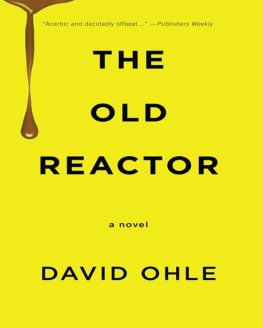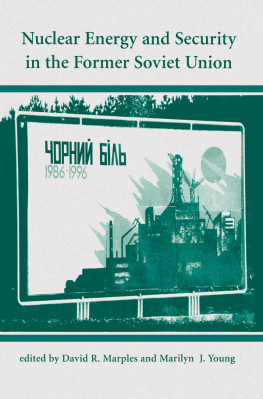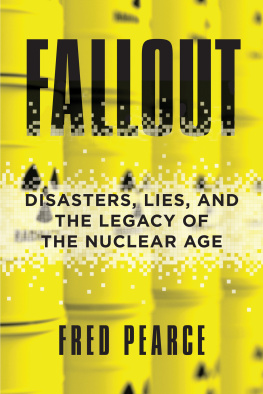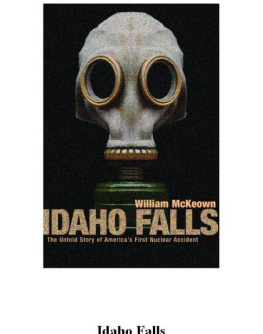
THE RADIOACTIVE BOY SCOUT
The True Story of a Boy and His Backyard Nuclear Reactor
KEN SILVERSTEIN

Random House NEW YORK
Contents
To my parents
Acknowledgments
First and foremost, my thanks to this works primary editor, Courtney Hodell, who called the day my story on David Hahn appeared in Harpers Magazine and said she was determined to see that I turn it into a book. She then patiently and skillfully helped transform a very rough first draft into this final product. Any of the books shortcomings are surely mine and not hers.
Special thanks also to my agent Melanie Jackson and to several other editors who worked on this book at Random House and Fourth Estate, especially Katie Hall, but also Tim Farrell and Clive Priddle.
Id also like to thank Clara Jeffery, who edited the Harpers story on David Hahn, and Lewis Lapham, that magazines editor, who commissioned it.
My thanks also to David Hahn and his family for enduring my frequent visits to the Detroit area as well as my endless phone calls asking for just one more piece of information.
Last but not least, thanks to my wife, Clara Rivera, and my two children, Sophia and Gabriel, for their patience throughout.
Prologue
Men in White: The Nuclear Age Comes to Golf Manor
There is hardly a boy or a girl alive who is not keenly interested in finding out about things. And thats exactly what chemistry is: Finding out about thingsfinding out what things are made of and what changes they undergo. What things? Any thing! Every thing!
The Golden Book of Chemistry Experiments, 1960
Golf Manor is the kind of place where nothing unusual is supposed to happen, the kind of place in which people live precisely because it is more than twenty-five miles from downtown Detroit and theoretically away from the poverty, crime, and other complications attendant on that city. Its the kind of place where money buys a bit more land than in the city, perhaps a second bathroom, and so reassures residents that theyre safely in the bosom of the middle class.
Nestled in a small community called Commerce Township, Golf Manor takes its name from the eighteen-hole golf course at its entrance. The houses wind along about a dozen streets lined with trees both old and varied enough to make Golf Manor feel more like a neighborhood than a subdivision, and the few features that do convey subdivisiona sign at the entrance saying, We have many children but none to spare. Please drive carefullyhave a certain 1950s charm.
A typical summer afternoon in Golf Manor brings, under sunny blue skies and a light breeze, the sight of mothers exchanging gossip as they push their newborns in strollers and the sounds of a few lawn mowers and an occasional whoop from kids jumping on a trampoline or swimming in a backyard pool. In short, it is the kind of place where the only thing lurking around the corner is likely to be a Mister Softee ice-cream truck or a religious devotee peddling the Gospel door-to-door.
However, June 26, 1995, would not go down in Golf Manors collective memory as a typical day, a fact Dottie Pease grasped immediately when she turned onto Pinto Drive. Dottie had risen early for work and now, with the sun beginning its slow late-afternoon descent, wanted nothing more than to pull off her shoes and drop to the living-room couch for a rest before dinner. As she neared her home, though, Dottie registered a scene so strange that she might as well have driven straight into an X-Files episode.
For what she saw, through a fog of bewilderment and dread, was eleven men swarming across her carefully manicured lawnthree of them enveloped in white, ventilated moon suits. The attention of the men seemed to be focused on the backyard of the house next door to hers, specifically on a large, wooden potting shed that abutted the chain-link fence between the properties. Thick, leafy branches from a tree in Dotties yard covered the top of the shed, which sat directly in front of a swimming pool that was largely empty save for a small forest of six-foot weeds growing up through cracks in the bottom.
The three men in protective suits were dismantling the potting shed with electric saws. Several others were running an industrial-strength vacuum cleaner across the grass and through the swimming pool. The crews were dumping the shed remnants and vacuumed debris into large, jet-black steel drums emblazoned with bright yellow signs warning of radioactivity.
Dottie parked her car in her driveway and ran to join a group of about twenty Golf Manor denizens who were mustered in front of the house where the men were working. The moods on the block ranged from perplexed and anxious to flat-out panicked. The fear only grew as the chainsaw-wielding clean-up crew, who Dottie learned worked for the federal Environmental Protection Agency, offered no explanation for its activities beyond vague and empty-sounding assurances that there was nothing for residents to worry about.
In lieu of information, Golf Manor residents had only speculation. Unfortunately, they had little to go on. The home that so preoccupied the EPA belonged to a middle-aged couple, Michael Polasek and Patty Hahn, who on weekends were joined by Pattys teenage son, David. A polite young man with blond hair, hazel-green eyes, and a freckled face, David didnt seem the sort to cause serious trouble. But he was not in Golf Manor on the day of the EPAs arrival to answer for himself.
Michael and Patty, on the other hand, did have a few quirks. For starters, they were drinkers whose arguments had on occasion become loud, nasty, and public. Furthermore, Patty, though generally pleasant, had an edgy, hostile streak that could show itself without the slightest warning. Michael seemed less volatile, but he sometimes startled and annoyed neighbors by behaving like an overgrown adolescent. One of his occasional pastimes was relaxing in the backyard with a beer and a small pile of M-80s (a powerful firework whose kick is equivalent to a quarter stick of dynamite), which he detonated in the abandoned swimming pool.
Still, Dottie had never spotted anything seriously weird at the house next doorat least not weird enough to explain the federal intervention unfolding before her eyes. Now, though, as she huddled with her neighbors and tried to make sense of the situation, Dottie heard one resident who claimed to have woken late on a recent night and seen, from a back window, the potting shed emitting an eerie glow. This pushed Dotties alarm to new heights, she later recalled. I went inside and called my husband. I said, Da-a-ve, there are men in funny suits walking around out here. Youve got to do something.
Bill Larson, a newcomer to the neighborhood, lived just three doors down from Michael and Patty. He was in an especially fine mood when he pulled onto Pinto Drive that afternoon, as he had just been visiting his wife and three-day-old son at the hospital. But as he daydreamed about bringing his newborn home to this cozy nook of a neighborhood, he was suddenly confronted with the EPA spectacle. Great, he thought, Ive got a new house for my family and its sitting in the middle of a toxic dump.
For the next three days, the EPA crew worked away in Michael and Pattys backyard. They broke down the potting shed until nothing remained in its place but a patch of dirt. They painstakingly vacuumed up every last piece of debris and dust from the work site. And then they loaded the steel drums with the radioactive-warning signs onto a flatbed truck, which departed for points unknown.
Next page













